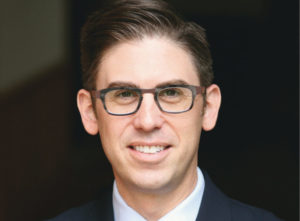Commentary on Parshat Ki Tavo (Deuteronomy 26:1 – 29:8)
“…My father was a fugitive Aramean. He went down to Egypt with meager numbers and sojourned there; but there he became a great and very populous nation” (Deut. 26:5).
This verse constitutes the kernel of the Passover Haggadah. When we tell our freedom story, we start here.
It comes from our weekly Torah portion, Ki Tavo. Once the Israelites arrive in the Promised Land, settle it, and cultivate it, they must present a basket of choice produce to the priest. They are told to recite a formula, a compact narrative of the Israelite experience, from nomadism to bondage to deliverance to inheritance. That formula begins with the invocation, “My father was a fugitive Aramean,” or so it is often translated.
Arami oveid avi, the Hebrew reads. The words Arami, “Aramean” (meaning a person from the territory of Aram, in modern-day Syria) and avi, “my father,” are easily translated. But the meaning of oveid is ambiguous here. Oveid (from the root alef-vet-dalet) can mean “to lose,” but it can also mean “to perish” or “destroy.” In the context of our portion, it might mean “to be lost,” “to go astray,” or, as the JPS translation has it, to be a “fugitive.” But Jewish tradition suggests other possible renderings.
A comparison of different translations of the Haggadah proves this. The Open Door: A Passover Haggadah (ed. Sue Levi Elwell, CCAR Press, 2002), says:
“My ancestors, wandering Arameans,
went down to Egypt and sojourned there, few in number” (p. 46).
…Adding this explanatory note:
“We are descendants of wanderers from the region known as Aram. Abram and Sarai left their home to follow God to an unknown land” (Ibid).
The Open Door identifies the “fugitive” or “wandering” Arameans with our ancestors, Abram and Sarai—that is to say, the patriarchs and matriarchs of the Jewish people. Pioneers who left home to answer God’s call.
On the other hand, the Soncino Koren Haggada (1965) says: “‘An Aramean sought to destroy my father, and he went down to Mizrayim [Egypt]….’”
 In contradistinction to our first example, the “Aramean” here is an enemy of our people. “An Aramean sought to destroy my father.”
In contradistinction to our first example, the “Aramean” here is an enemy of our people. “An Aramean sought to destroy my father.”
The traditional Haggadah identifies this enemy as Laban the Aramean, who denied Jacob his betrothal to Rachel, kept him in indentured servitude for years, and pursued him across the border when Jacob tried to flee.
Thus does tradition present us with a second version of the Arami oveid: not a wandering Jew, but a foreigner bent on destroying our people.
We are left with two divergent understandings of the same three Hebrew words.
One translation portrays our people as intrepid pioneers, path-seekers who left their home, Aram, setting out on a journey of discovery, prompted by God’s call to Abram: Lech-lecha, “Go forth.”
The other translation makes us vulnerable to enemies out to destroy us, the way Laban hunted down Jacob.
Sign up to receive Torah from T’ruah in your inbox each week!
How we choose to translate our verse speaks volumes about our fundamental conception of Jewish history and Jewish identity.
We can choose to see ourselves as history’s victims, perpetually vulnerable to the next Nebuchadnezzar, Caesar, Hitler or Ahmadinejad who seeks the destruction of the Jewish people or Jewish state. The rise of Neo-Nazism and White Nationalism; the increasingly virulent delegitimization of Israel in the media and on college campuses; the rise in public anti-Semitism in both word and deed, all give cause for increased vigilance.
When our own awareness of historic Jewish vulnerability increases our sensitivity to other present-day vulnerable populations — particularly immigrants and refugees who are fleeing their own Laban-like pursuers — then this component of Jewish identity can supply some of the energy required for us to be a light unto the nations of the world. (The analogy of the Torah’s “wandering Aramean” to the fugitive Syrian is particularly pointed and poignant these days.)
I would submit, however, that an overarching “victim mentality” is not only of limited utility, but also can backfire on us — preventing us from actualizing the fullest and most positive potential of Judaism in the world today.
Can we Jews advocate for the plight of the Arabic-speaking refugee and the Spanish-speaking immigrant as willingly as we rally around Israel when rockets rain down from Gaza? Even more, can we move out of the limiting binary mindset that prevents us from looking out for our own as well as the other? Can we see ourselves as both fugitive and path-seeker?
In the final analysis, an investment in a vibrant, inclusive, justice-seeking Judaism that cares equally about today’s most vulnerable populations as we do about our own people, may be our best hedge against anti-Semitism and our best hope for a long and bright future for the Jewish People and the Jewish tradition.
Jonathan E. Blake is senior rabbi of Westchester Reform Temple in Scarsdale, New York. He is a regular commentator on Jewish text and Jewish life who is published in numerous books and periodicals and appears in the documentary films 51 Birch Street (2005) and 112 Weddings (2014).

